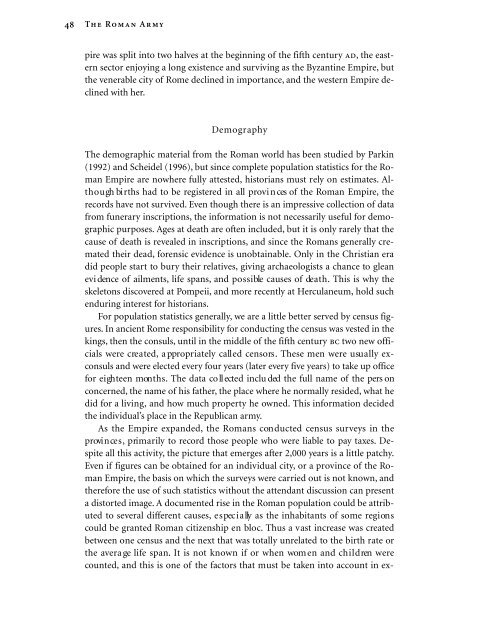- Page 2:
The Roman Army
- Page 5 and 6:
Copyright © 2006 by Pat Southern A
- Page 7 and 8:
vi C on ten ts Guard Troops: The Eq
- Page 9 and 10:
viii C on ten ts Britain in AD 83/8
- Page 11 and 12: x The Roman A rmy and listened, to
- Page 14: The Roman Army
- Page 17 and 18: 2 The Roman A rmy new adversaries,
- Page 19 and 20: 4 The Roman A rmy con tro l , co u
- Page 21 and 22: 6 The Roman A rmy tives asking for
- Page 23 and 24: 8 The Roman A rmy Bowman, 1983; Bow
- Page 25 and 26: 10 The Roman A rmy the overall pict
- Page 27 and 28: 12 The Roman A rmy Perhaps by way o
- Page 29 and 30: 14 The Roman A rmy The inner panels
- Page 31 and 32: 16 The Roman A rmy Trajan’s Colum
- Page 33 and 34: 18 The Roman A rmy build up a pictu
- Page 35 and 36: 20 The Roman A rmy freedom and inde
- Page 37 and 38: 22 The Roman A rmy vers and battles
- Page 39 and 40: 24 The Roman A rmy the tri bes of s
- Page 41 and 42: 26 The Roman A rmy Titus Livius (Li
- Page 43 and 44: 28 The Roman A rmy his work provide
- Page 45 and 46: 30 The Roman A rmy Hyginus cannot b
- Page 47 and 48: 32 The Roman A rmy 371 to 392 (Bran
- Page 49 and 50: 34 The Roman A rmy a rmy, f ron ti
- Page 51 and 52: 36 The Roman A rmy Prosopographia I
- Page 53 and 54: 38 The Roman A rmy Rome was founded
- Page 55 and 56: 40 The Roman A rmy supplies was vit
- Page 57: 42 Map of the Roman Empire in the m
- Page 60 and 61: The term p ro v i n c i a did not o
- Page 64 and 65: H i s t o r i c a l Ba c k g r o u
- Page 66 and 67: Ancient sources for the regal perio
- Page 68 and 69: H i s t o r i c a l Ba c k g r o u
- Page 70 and 71: H i s t o r i c a l Ba c k g r o u
- Page 72 and 73: H i s t o r i c a l Ba c k g r o u
- Page 74 and 75: intended to keep to himself, as wel
- Page 76 and 77: Sharing power with a colleague was
- Page 78 and 79: set the total at 600, a figure that
- Page 80 and 81: The principal duties of the consuls
- Page 82 and 83: the ri ght of i n terce s s i o, or
- Page 84 and 85: H i s t o r i c a l Ba c k g r o u
- Page 86 and 87: H i s t o r i c a l Ba c k g r o u
- Page 88 and 89: During the Republic there were two
- Page 90 and 91: H i s t o r i c a l Ba c k g r o u
- Page 92 and 93: H i s t o r i c a l Ba c k g r o u
- Page 94 and 95: H i s t o r i c a l Ba c k g r o u
- Page 96 and 97: H i s t o r i c a l Ba c k g r o u
- Page 98 and 99: H i s t o r i c a l Ba c k g r o u
- Page 100 and 101: H i s t o r i c a l Ba c k g r o u
- Page 102 and 103: The Army of the Roman Republic Chap
- Page 104 and 105: class (classis means “calling”)
- Page 106 and 107: n euvers but could also provi de ac
- Page 108 and 109: total of 600 men, but the numbers o
- Page 110 and 111: tilius Rufus, had assembled an army
- Page 112 and 113:
The Roman A rmy 97 Roman soldiers e
- Page 114 and 115:
have been awarded its title Victrix
- Page 116 and 117:
as h a s t a tus po s teri o r, t h
- Page 118 and 119:
The Roman A rmy 103 There was no ex
- Page 120 and 121:
of the ba ll i s t a ri i , u n der
- Page 122 and 123:
From time to time soldiers could lo
- Page 124 and 125:
The Roman A rmy 109 Standardization
- Page 126 and 127:
The military records were scru p u
- Page 128 and 129:
The Roman A rmy 113 Local provision
- Page 130 and 131:
nu s , h ad been sent to ga t h er
- Page 132 and 133:
The Roman A rmy 117 wise at the acc
- Page 134 and 135:
Troops in Rome: The Urban Cohorts a
- Page 136 and 137:
The Roman A rmy 121 constantly move
- Page 138 and 139:
L i ke the ju n i or of f i cers in
- Page 140 and 141:
these were the legionary centurions
- Page 142 and 143:
The Roman A rmy 127 The normal tour
- Page 144 and 145:
the other five were equestrian trib
- Page 146 and 147:
Recruitment Ot h er Ra n k s The Ro
- Page 148 and 149:
ashing. For the majority of recruit
- Page 150 and 151:
The Roman A rmy 135 Ha n n i b a l
- Page 152 and 153:
chosen, or whether they had to appl
- Page 154:
The Roman A rmy 139 Ch ee s m a n ,
- Page 157 and 158:
142 The Roman A rmy manders usually
- Page 159 and 160:
144 The Roman A rmy original recrui
- Page 161 and 162:
146 The Roman A rmy from battle, le
- Page 163 and 164:
148 The Roman A rmy unit prob a bly
- Page 165 and 166:
150 The Roman A rmy Alaudae (the la
- Page 167 and 168:
152 The Roman A rmy does not imply
- Page 169 and 170:
154 The Roman A rmy mental chronolo
- Page 171 and 172:
156 The Roman A rmy the knee , but
- Page 173 and 174:
158 The Roman A rmy verted bowl mad
- Page 175 and 176:
160 The Roman A rmy Holidays and Ob
- Page 177 and 178:
162 The Roman A rmy The purely mili
- Page 179 and 180:
164 The Roman A rmy m i s s i o) .
- Page 181 and 182:
166 The Roman A rmy skirts are laid
- Page 183 and 184:
168 The Roman A rmy As noted above,
- Page 186 and 187:
Chapter 5 The Roman Army at War Doc
- Page 188 and 189:
The Roman A rmy at Wa r 173 ref u s
- Page 190 and 191:
The Roman A rmy at Wa r 175 Soldier
- Page 192 and 193:
The Roman A rmy at Wa r 177 Undated
- Page 194 and 195:
Map showing the locations of the fr
- Page 196 and 197:
Plan of Wallsend fort, which stood
- Page 198 and 199:
The Roman A rmy at Wa r 183 Arch of
- Page 200 and 201:
The Roman A rmy at Wa r 185 the fro
- Page 202 and 203:
tail, chiefly from Britain and to s
- Page 204 and 205:
• Mules carrying the sections of
- Page 206 and 207:
On the march, the eight men of a c
- Page 208 and 209:
The Roman A rmy at Wa r 193 Tem por
- Page 210 and 211:
The Roman A rmy at Wa r 195 The Rom
- Page 212 and 213:
The Roman A rmy at Wa r 197 could t
- Page 214 and 215:
t h em . A good example of this is
- Page 216 and 217:
The Roman A rmy at Wa r 201 ti on c
- Page 218 and 219:
The Roman A rmy at Wa r 203 closely
- Page 220 and 221:
The Roman A rmy at Wa r 205 the wal
- Page 222 and 223:
The Roman A rmy at Wa r 207 36 bc,
- Page 224 and 225:
Chapter 6 Tools of War We a pon r y
- Page 226 and 227:
shield unwieldy and therefore usele
- Page 228 and 229:
spatha in an archaeological dig doe
- Page 230 and 231:
Engraving after The Catapult by Edw
- Page 232 and 233:
took rep l ace a ble spri n gs so t
- Page 234 and 235:
Tools of Wa r 219 animals by foragi
- Page 236 and 237:
Tools of Wa r 221 down to 5,000 men
- Page 238 and 239:
Tools of Wa r 223 and Tiberius as t
- Page 240 and 241:
individual soldiers or were corpora
- Page 242 and 243:
Tools of Wa r 227 3 5 . 2 - 4 ) . G
- Page 244 and 245:
e s pon den ce , dealt with em b a
- Page 246 and 247:
Tools of Wa r 231 s en t . As Po ly
- Page 248 and 249:
their own decisions about how to re
- Page 250 and 251:
Tools of Wa r 235 Several of the at
- Page 252 and 253:
V-shaped cut, and if the bullet is
- Page 254 and 255:
the majori ty being the legi on a r
- Page 256 and 257:
Tools of Wa r 241 Title page of a m
- Page 258:
Tools of Wa r 243 Dixon, Karen R.,
- Page 261 and 262:
246 The Roman A rmy The hard-presse
- Page 263 and 264:
248 The Roman A rmy of the late thi
- Page 265 and 266:
250 The Roman A rmy ing the third c
- Page 267 and 268:
252 Map of the later Roman Empire r
- Page 269 and 270:
254 The Roman A rmy Danube may owe
- Page 271 and 272:
256 The Roman A rmy ti ons should c
- Page 273 and 274:
258 The Roman A rmy PROFITEERING IN
- Page 275 and 276:
260 The Roman A rmy of ad 366 refer
- Page 277 and 278:
262 The Roman A rmy In the later Ro
- Page 279 and 280:
264 The Roman A rmy The late Roman
- Page 282 and 283:
Chapter 8 Great Soldiers and Battle
- Page 284 and 285:
iography surely starts with him, an
- Page 286 and 287:
G r e at S o l d i e r s a n d B at
- Page 288 and 289:
G r e at S o l d i e r s a n d B at
- Page 290 and 291:
G r e at S o l d i e r s a n d B at
- Page 292 and 293:
G r e at S o l d i e r s a n d B at
- Page 294 and 295:
The greatest general of his day, Po
- Page 296 and 297:
G r e at S o l d i e r s a n d B at
- Page 298 and 299:
G r e at S o l d i e r s a n d B at
- Page 300 and 301:
G r e at S o l d i e r s a n d B at
- Page 302 and 303:
G r e at S o l d i e r s a n d B at
- Page 304 and 305:
G r e at S o l d i e r s a n d B at
- Page 306 and 307:
G r e at S o l d i e r s a n d B at
- Page 308 and 309:
scription comes from the pen of Sue
- Page 310 and 311:
G r e at S o l d i e r s a n d B at
- Page 312 and 313:
G r e at S o l d i e r s a n d B at
- Page 314 and 315:
G r e at S o l d i e r s a n d B at
- Page 316 and 317:
G r e at S o l d i e r s a n d B at
- Page 318 and 319:
G r e at S o l d i e r s a n d B at
- Page 320 and 321:
G r e at S o l d i e r s a n d B at
- Page 322 and 323:
tri be s , he cut of f the hands of
- Page 324 and 325:
ing one cohort from the third line
- Page 326 and 327:
G r e at S o l d i e r s a n d B at
- Page 328 and 329:
G r e at S o l d i e r s a n d B at
- Page 330 and 331:
conquered the rest of Britain after
- Page 332 and 333:
G r e at S o l d i e r s a n d B at
- Page 334 and 335:
G r e at S o l d i e r s a n d B at
- Page 336 and 337:
e fe r e n c e s a n d f u r t h e
- Page 338 and 339:
Chapter 9 Current Assessment Ma j o
- Page 340 and 341:
C u r r e n t A s s e s s m e n t 3
- Page 342 and 343:
C u r r e n t A s s e s s m e n t 3
- Page 344 and 345:
of Rom a n s , provi n c i a l s ,
- Page 346 and 347:
Appendix Rank Structure in the Roma
- Page 348 and 349:
160 men. The five centurions were r
- Page 350 and 351:
Glossary acetum: sour wine ad signa
- Page 352 and 353:
G l o s s a ry 337 constitutio anto
- Page 354 and 355:
G l o s s a ry 339 in command to a
- Page 356:
G l o s s a ry 341 tribunus plebis:
- Page 359 and 360:
344 B i b l i o g r a p h y PBSR Pa
- Page 361 and 362:
346 B i b l i o g r a p h y Develin
- Page 363 and 364:
348 B i b l i o g r a p h y Robinso
- Page 366 and 367:
Index A note on Roman names: the Ro
- Page 368 and 369:
Arch of Severus, 14, 107, 321 (phot
- Page 370 and 371:
Black Sea, 241 Block-and-tackle, 23
- Page 372 and 373:
Cavalry, 91-92, 93, 94, 101-102, 14
- Page 374 and 375:
Cornelius Celsus, Aulus, 236-237 Co
- Page 376 and 377:
Elections, 2 Elginhaugh, 223 Elite
- Page 378 and 379:
and transmission of orders, 203 Gen
- Page 380 and 381:
Javelin. See Pilum Javolenus Priscu
- Page 382 and 383:
Librarii, 105, 333 Liccaius (rival
- Page 384 and 385:
and treatment of wounds, 236-237 an
- Page 386 and 387:
Patrimonium, 74-75, 78 Pax Romana,
- Page 388 and 389:
Pulcher, Commander under Arrian, 20
- Page 390 and 391:
Senate, 59 and decision to go to wa
- Page 392 and 393:
water, 111, 114, 221 See also Food
- Page 394 and 395:
See also Food supply; Supplies Trea
- Page 396:
and Praetorians, 117 and Urban Coho










